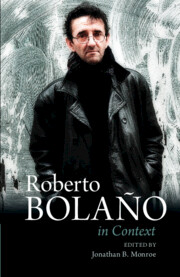Book contents
- Roberto Bolaño in Context
- Roberto Bolaño in Context
- Copyright page
- Contents
- Contributors
- Chronology
- Part I Geographical, Social, and Historical Contexts
- Part II Shaping Events and Literary History
- Chapter 9 France, Spain, 1938
- Chapter 10 The Cold War
- Chapter 11 After the Fall of the Wall: 1989–2001
- Chapter 12 Latin American Literature
- Chapter 13 French Connections
- Chapter 14 German and Russian Precursors
- Chapter 15 After the Two 9/11s: Santiago, 1973, New York, 2001
- Part III Genres, Discourses, Media
- Part IV Aesthetics, Culture, and Politics
- Further Reading
- Index
Chapter 10 - The Cold War
from Part II - Shaping Events and Literary History
Published online by Cambridge University Press: 15 December 2022
- Roberto Bolaño in Context
- Roberto Bolaño in Context
- Copyright page
- Contents
- Contributors
- Chronology
- Part I Geographical, Social, and Historical Contexts
- Part II Shaping Events and Literary History
- Chapter 9 France, Spain, 1938
- Chapter 10 The Cold War
- Chapter 11 After the Fall of the Wall: 1989–2001
- Chapter 12 Latin American Literature
- Chapter 13 French Connections
- Chapter 14 German and Russian Precursors
- Chapter 15 After the Two 9/11s: Santiago, 1973, New York, 2001
- Part III Genres, Discourses, Media
- Part IV Aesthetics, Culture, and Politics
- Further Reading
- Index
Summary
This chapter describes Roberto Bolaño’s life and work in the context of the Cold War. In Latin America, that conflict between the United States and the Soviet Union often had the character of an internal civil war. Many of the region’s most prominent writers, who by and large belonged to the political left, spoke about Cold War politics as a continuation of U.S. imperialism in the region. But there were also deep divisions on the left. Some writers were pro-Soviet, while others were anti-Stalinist. After the Cuban Revolution, it too became a fault line. Born in 1953, Bolaño began his literary career at a time in the early 1970s when these political and literary paths seemed increasingly exhausted. As a young provocateur, he mocked the pretensions of both Communists and anti-Communists. His works often feature the invented lives of writers, but not in the heroic or redemptive roles they are sometimes mythologized as playing. Bolaño’s major output, published in the 1990s and 2000s, looks back on the Cold War with a sense of loss: the losses of accumulated violence, and the lost dreams of political justice that could not come to pass.
- Type
- Chapter
- Information
- Roberto Bolaño In Context , pp. 113 - 125Publisher: Cambridge University PressPrint publication year: 2023

